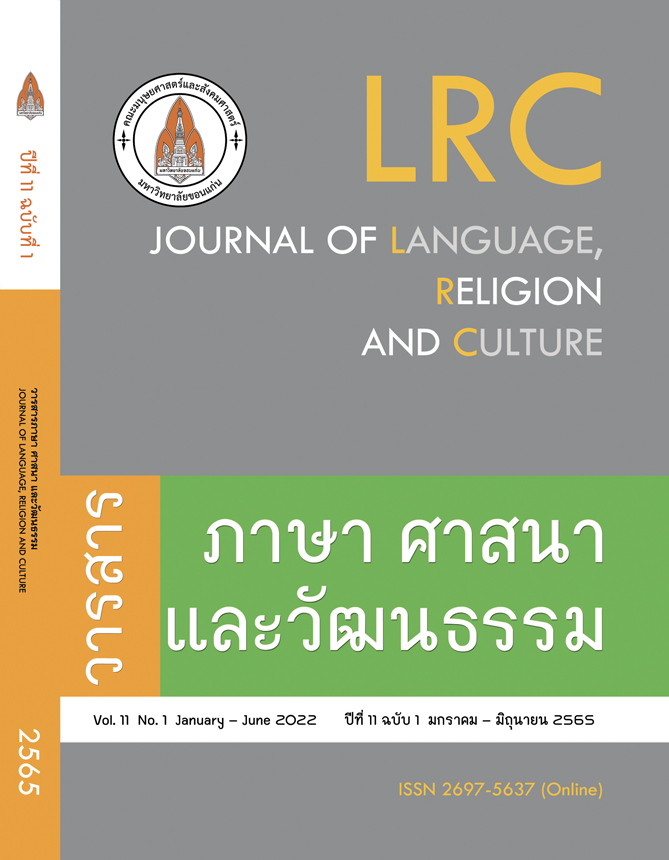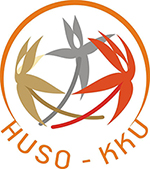Language Attitude and Language Choice of Thai - Chinese in Betong District, Yala Province
ทัศนคติต่อภาษาและการเลือกภาษาของคนไทยเชื้อสายจีนในอำเภอเบตง จังหวัดยะลา
Keywords:
Language attitude, Language choice , Thai – Chinese, Betong District, Yala Province , ทัศนคติต่อภาษา, การเลือกภาษา, คนไทยเชื้อสายจีน, อำเภอเบตง, จังหวัดยะลาAbstract
The purpose of this paper is to study the language attitude and language choice of Thai - Chinese in Betong District, Yala Province. This research is quantitative research. The data were collected from questionnaires, with a total number of 60 samples, divided into 3 age groups, the young-age group (namely under 25 years old), the middle-age group (30-45 years old) and the old-age group (over 60 years old), 20 people for each group. Data were analyzed by using mean average and percentage.
The study shows that compared with the 3 age groups, the old-age group has a more positive attitude towards Mandarin (4.83). The middle-age group and the young-age group had more positive attitudes towards standard Thai (4.44, 4.42). The comparison of the language attitudes of the three age groups shows that the old-age group’s positive attitudes towards Mandarin and Chinese dialects are higher than those of the middle-age group and the young-age group. Compared with the other two groups, the middle-age group had a more positive attitude towards standard Thai.
An analysis of language choice by percentage revealed that the 3age groups did not choose only one language in accordance with domains of language. In informal domains of language, the old-age group chose the Chinese dialect or language mixed with Chinese dialect. The middle-age group and the young-age group chose standard Thai. In formal domains language, the old-age group chose Mandarin at school domain and standard Thai in work domain. The middle-age group chose standard Thai in both circles. The young-age group chose standard Thai in school domain and Mandarin in work domain. Language attitude affected language choice. For example, the middle-age group had the most positive attitude towards the standard Thai. Therefore, this group chose the standard Thai more than other groups. In addition, it was discovered that Chinese dialect is in a state of language shift. Because the young-age group is less likely to choose the Chinese dialect.
Keyword: language attitude; language choice; Thai - Chinese; Betong District, Yala Province
References
โครงการศูนย์ความเป็นเลิศ. (2563). ประชากร. สืบค้นจาก http://fms.yru.ac.th/betong/page/68/%E0%B8%9B%E0%B8%A3%E0%B8%B0%E0%B8%8A%E0%B8%B2%E0%B8%81%E0%B8%A3.html
ณัฐพล ชารีรักษ์ และ วิรัช วงศ์ภินันท์วัฒนา. (2564). ภาวะหลายภาษาของวัยรุ่นผู้ไทในอำเภอธาตุพนม จังหวัดนครพนม. วารสารภาษา ศาสนา และวัฒนธรรม, 10(1), 54-80.
นันทนา วงษ์ไทย. (2563). ทัศนคติทางอ้อมของกลุ่มชาติพันธุ์มลายูปาตานีต่อผู้พูดภาษามลายูปาตานีและผู้พูดภาษาไทยมาตรฐาน. Journal of Liberal Arts, Prince of Songkla University, 12(2), 98-120.
ภัสร์ธีรา ฉลองเดช. (2559). สถานการณ์และทัศนคติการใช้ภาษาตากใบ ในอำเภอตากใบ จังหวัดนราธิวาส (วิทยานิพนธ์ปรัชญาดุษฎีบัณฑิต). มหาวิทยาลัยธรรมศาสตร์, กรุงเทพฯ.
วรรธนะ ปัญบุตร. (2561). ทัศนคติต่อภาษาและการเลือกภาษาของชาวผู้ไท อำเภอคำม่วง และอำเภอสามชัย จังหวัดกาฬสินธุ์ (วิทยานิพนธ์อักษรศาสตรมหาบัณฑิต). มหาวิทยาลัยศิลปากร, นครปฐม.
วรรธนะ ปัญบุตร และสุวัฒนา เลี่ยมประวัติ. (2561). การเลือกภาษาของชาวผู้ไทอำเภอคำม่วงและอำเภอสามชัย จังหวัดกาฬสินธุ์. Veridian E-Journal, Silpakorn University. ฉบับภาษาไทย สาขามนุษยศาสตร์ สังคมศาสตร์ และศิลปะ, 11(3), 1747-1766.
อมรา ประสิทธิ์รัฐสินธุ์. (2532). คำจำกัดความศัพท์ในภาษาศาสตร์สังคม. กรุงเทพฯ: โรงพิมพ์แห่งจุฬาลงกรณ์มหาวิทยาลัย.
อรประพิณ กิตติเวช. (2559). ทัศนคติต่อภาษาไทยถิ่นกำแพงแสนและการแปรของวรรณยุกต์ตามปัจจัยทางสังคม: การศึกษาแนวสัทศาสตร์เชิงสังคม (วิทยานิพนธ์อักษรศาสตรดุษฎีบัณฑิต). มหาวิทยาลัยศิลปากร, นครปฐม.
อรประพิณ กิตติเวช จุไรรัตน์ ลักษณะศิริ และจุฑามณี อ่อนสุวรรณ. (2560). ปัจจัยทางสังคมและทัศนคติของชาวกำแพงแสนต่อภาษาไทยถิ่นของตน. Veridian E-Journal, Silpakorn University. ฉบับภาษาไทย สาขามนุษยศาสตร์ สังคมศาสตร์ และศิลปะ, 10(2), 1785-1802.
อำนาจ ปักษาสุข. (2561). ทัศนคติทางภาษาของวัยรุ่นไทยที่มีต่อผู้พูดภาษาไทยกลาง และผู้พูดภาษาไทยถิ่นอีสาน. วารสารสหศาสตร์, 18(2), 65-87.
Fasold, R. (1984). The Sociolinguistic of Society. Oxford: Basil Blackwell.
Garrett, P. (2010). Attitudes to language: Key topics in sociolinguistics. Cambridge University Press.
Holmes, J. (2013). An Introduction to Sociolinguistics. Edinburgh: Pearson Education Limited.
Wang, J. (2017). Survey of Current Situation among Uygur College Students in Language Life. Journal of Xinjiang Normal University (Philosophy and Social Sciences), 38(1), 153-160.
Wang, Y. (2015). Identity for Cultures of Three Languages and the Second Language Acquisition of Minority Students at Higher Vocational Colleges—Based on 10 Higher Vocational Colleges in Yunnan Province. Journal of Research on Education for Ethnic Minorities, 26(1), 109-113.
Downloads
Published
How to Cite
Issue
Section
License
Copyright (c) 2022 JOURNAL OF LANGUAGE, RELIGION AND CULTURE

This work is licensed under a Creative Commons Attribution-NonCommercial-NoDerivatives 4.0 International License.







